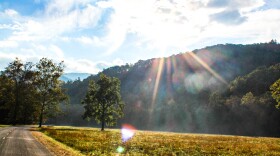Check out last week’s fire updates here.
December 15:
Firefighters announced they have achieved 100% containment of the Black Bear Fire on Pisgah National Forest’s Appalachian Ranger District.
The Forest Service posted that rain over the weekend helped firefighters complete containment of the fire.
However officials warned that western North Carolina is still in its worst drought since 2017, so residents are advised to abide by any restrictions and exercise caution if burning debris, and while driving or towing vehicles.
Tuesday afternoon December 12:
Fire restrictions for backcountry campsites on the Blue Ridge Parkway are lifted.
National Park Service officials remind visitors that while rain, cooler temperatures and shorter days make campfires safer, fire danger is still high across the region, according to a press release.
Park official also noted to always extinguish campfires until the firepit is cool to the touch.
Monday morning December 11:
Rain in western North Carolina have offered continued hope for fire control across the weekend. By Sunday, 1.2 inches of rain had fallen at the Black Bear Fire in Haywood County. The Forest Service estimates that the fire will be full contained on December 13.
The section of the Appalachian Trail between I-40 and Brown Gap Road remains closed.
Winter weather has also caused icy conditions and road closures in the area such as on the Blue Ridge Parkway.
The McDowell County fires, Locust Cove and Clear Cove, are both at the same percentage of containment.
Friday morning December 8:
Extreme drought has continued in Western North Carolina. Twice as many counties are experiencing extreme drought since last week. Parts of 14 counties are now experiencing extreme drought, according to the most recent drought map released on Thursday, December 7.
Three fires in the Pisgah National Forest are the last in the region.
The Big Bear Fire near the Great Smoky Mountains National Park is now 90% contained. It has burned over 2000 acres which equals over 3 square miles.
In McDowell County, firefighters are also making progress. The Locust Cove fire is 65% contained, it has burned 180 acres while the Clear Creek fire in McDowell County is 90% contained, it has burned 124 acres.

The Forest Service says that firefighters from at least eight states have been working to fight these fires.
“Our Pisgah NF firefighters have been working alongside crews from across the country. People employed by various agencies from Arizona, Arkansas, California, Montana, New Mexico, North Carolina, Oregon, Texas, and more are fighting these fires,” the Forest Service said.
The is also a prescribed burn in McDowell County right now. These fires can be a preventative measure to get rid of leaf litter and other debris so wildfires can’t spark.
Monday morning December 4:
Despite burn bans lifting last week, there is still significant fire danger across Western North Carolina.

The latest drought map shows seven counties here in the West are still in extreme drought - including Cherokee, Clay, Macon and Graham- along with parts of Swain, Jackson, Rutherford and Transylvania. The map was issued late last week.
Several wildfires are still burning in the Pisgah National Forest, which covers parts of 12 counties here in Western NC.
In Haywood County, more than 40 firefighters are on the scene of the Black Bear Fire which has burned more than 2,000 acres. The fire is 90% contained, according to the most recent update from the Forest Service on Sunday, December 3.
Progress is being made on two fires burning in McDowell County. A Saturday update from the Forest Service shows The Clear Creek Fire, which has burned just more than 120 acres, is 40% contained. The nearby Locust Cove Fire which has burned 165 acres is 25% contained.




